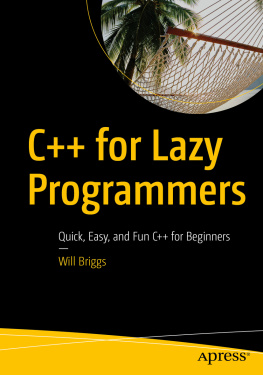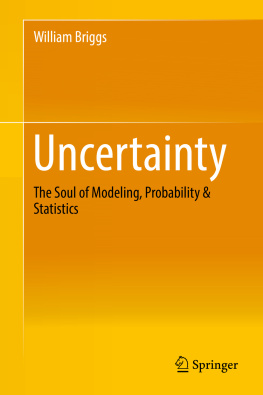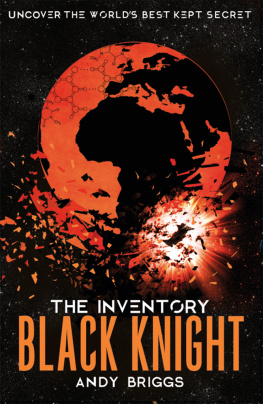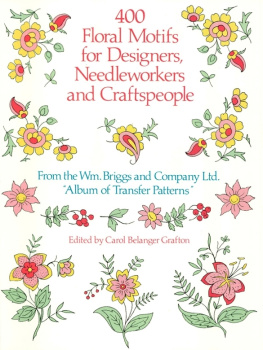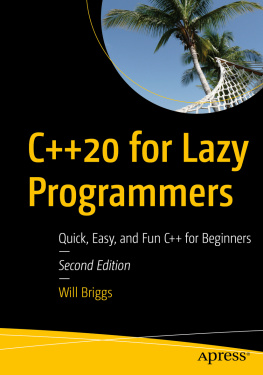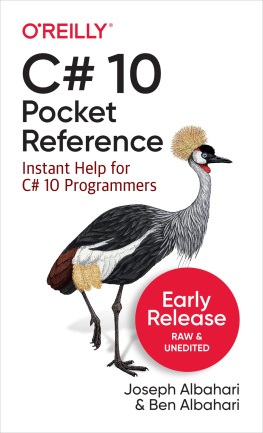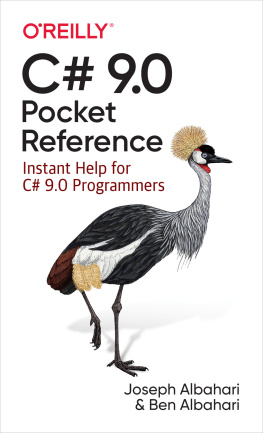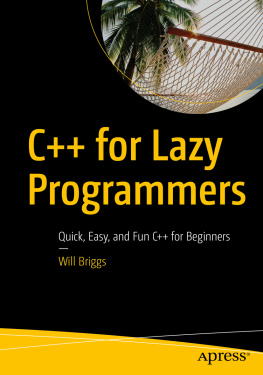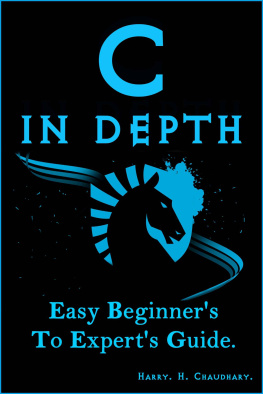Briggs - C++ for Lazy Programmers: Quick, Easy, and Fun C++ for Beginners
Here you can read online Briggs - C++ for Lazy Programmers: Quick, Easy, and Fun C++ for Beginners full text of the book (entire story) in english for free. Download pdf and epub, get meaning, cover and reviews about this ebook. City: Berkeley;CA, year: 2019, publisher: Apress, Imprint, Apress, genre: Home and family. Description of the work, (preface) as well as reviews are available. Best literature library LitArk.com created for fans of good reading and offers a wide selection of genres:
Romance novel
Science fiction
Adventure
Detective
Science
History
Home and family
Prose
Art
Politics
Computer
Non-fiction
Religion
Business
Children
Humor
Choose a favorite category and find really read worthwhile books. Enjoy immersion in the world of imagination, feel the emotions of the characters or learn something new for yourself, make an fascinating discovery.
- Book:C++ for Lazy Programmers: Quick, Easy, and Fun C++ for Beginners
- Author:
- Publisher:Apress, Imprint, Apress
- Genre:
- Year:2019
- City:Berkeley;CA
- Rating:4 / 5
- Favourites:Add to favourites
- Your mark:
- 80
- 1
- 2
- 3
- 4
- 5
C++ for Lazy Programmers: Quick, Easy, and Fun C++ for Beginners: summary, description and annotation
We offer to read an annotation, description, summary or preface (depends on what the author of the book "C++ for Lazy Programmers: Quick, Easy, and Fun C++ for Beginners" wrote himself). If you haven't found the necessary information about the book — write in the comments, we will try to find it.
C++ for Lazy Programmers: Quick, Easy, and Fun C++ for Beginners — read online for free the complete book (whole text) full work
Below is the text of the book, divided by pages. System saving the place of the last page read, allows you to conveniently read the book "C++ for Lazy Programmers: Quick, Easy, and Fun C++ for Beginners" online for free, without having to search again every time where you left off. Put a bookmark, and you can go to the page where you finished reading at any time.
Font size:
Interval:
Bookmark:
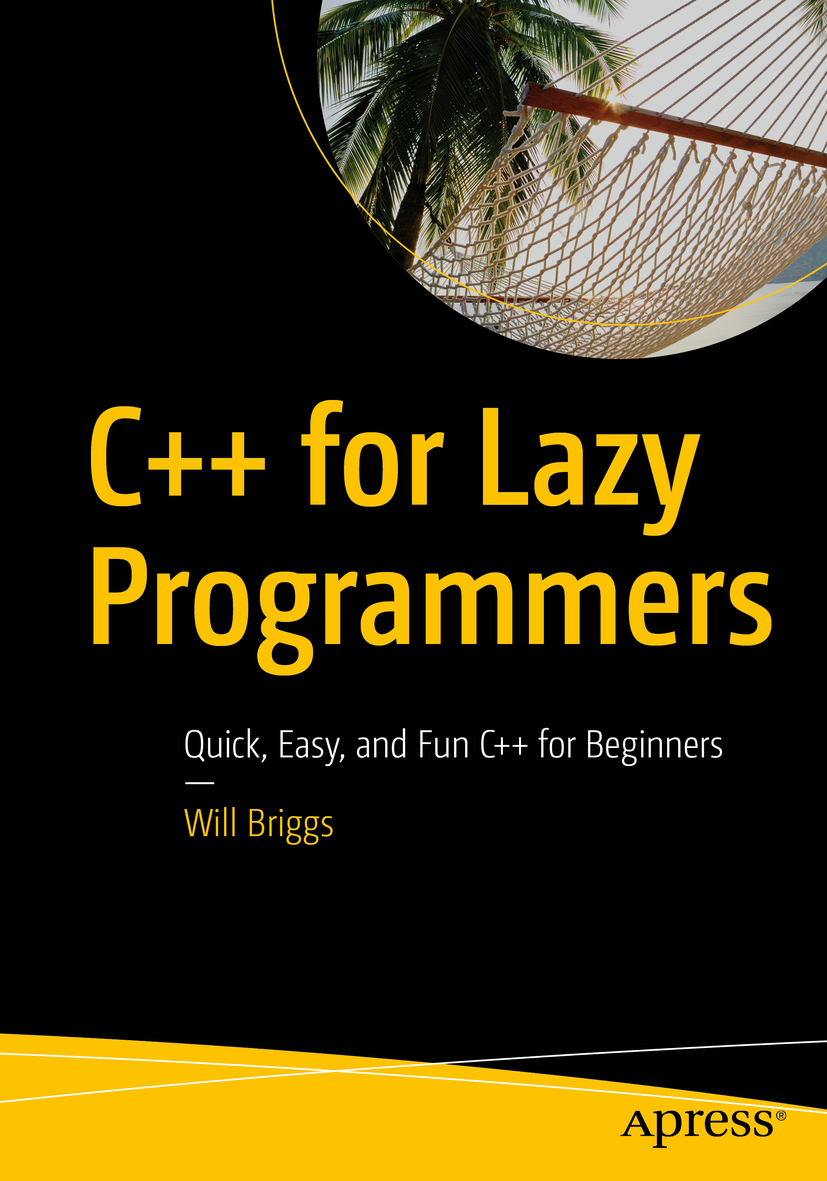

Any source code or other supplementary material referenced by the author in this book is available to readers on GitHub via the books product page, located at www.apress.com/9781484251867 . For more detailed information, please visit http://www.apress.com/source-code .
To my favorite C++ programmer and the love of my life;
To the little one who first inspired her to study at home so she wouldnt go mommy-crazy;
And to the boy whos already programming.
Surely theres no shortage of C++ intro texts. Why write yet another?
Im glad you asked.
Ever since moving from Pascal to C++ (back when dinosaurs roamed the Earth), Ive been underwhelmed by available resources. I wanted something quirky and fun to read, with sufficient coverage and fun examples, like the old Oh! Pascal! text by Cooper and Clancy.
Its about time we had this again. Even a perfectly accurate text with broad coverage gives you nothing if you fall asleep when you read it. Well, nothing but a sore neck.
But the other reason, of course, is to promote laziness.
We all want our projects to be done more quickly, with less wailing and gnashing of teeth. Sometimes, its said, you have to put your nose to the grindstone. Maybe, but I like my nose too well for that. Id rather do things the easy way.
But the easy way isnt procrastinating and dragging my feet: its to find something I love doing and do it so well that it feels relatively effortless. Its producing something robust enough that when it does break down, it tells me exactly what the problem is, so I dont have to spend a week pleading with it to explain itself. Its writing code that I can use again and again, adapting it to a new use in hours instead of days.
Youll benefit from this book if youre a beginning programmer or one who hasnt yet learned C++ or its descendants like Java or C#; if you already know a C++-like language, you can go a little faster.
A pleasant reading experience.
Adequate coverage.
Games, that is, use of the SDL graphics library, which makes it easy to get graphics programs working quickly and easily. It isnt fair that Python and Visual Basic should get all the eye candy.. After that well use more standard (but less visually interesting) I/O, so we can also get practice with the more common console programs.
and an easy introduction to SDLs graphical magic, using the SSDL library (see below).
Sufficient examples, and they wont all be about actuarial tables or how to organize an address book. (See pleasant reading experience earlier.)
Antibugging sections throughout the text to point out common or difficult-to-trace errors and how to prevent them.
Compatibility with g++ and Microsoft Visual Studio.
Compliance with C++17, the latest standard, and the nice goodies it provides.
For g++ programmers, instructions on using g++, the ddd/gdb debugger system, and Makefiles; for Visual Studio, use of the debugger and project files.
An appreciation of laziness.
A cool title. Maybe I could have tried to write a For Dummies book, but after seeing Bioinformatics for Dummies Im not sure I have what it takes.
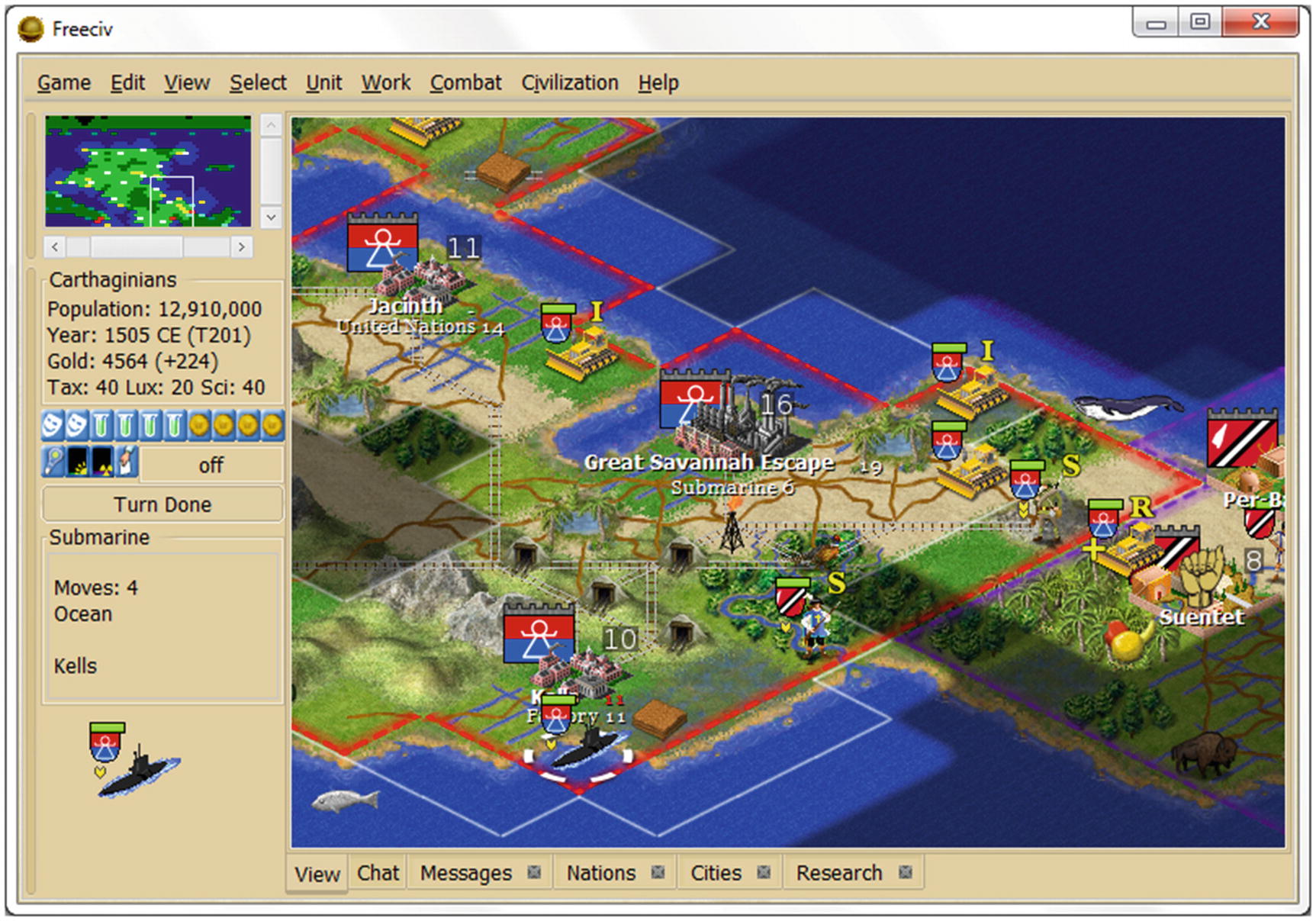
A game of Freeciv, which uses the SDL library.
but although SDL is relatively simple, its not simple enough to start with on day 1 of programming with C++. SSDL ( Simple SDL) saves you from needing to know things we dont get to until Chapter ). It also hides the initialization and cleanup code thats pretty much the same every time you write a program, and makes error handling less cumbersome.
You may want to keep using SSDL as is after youre done with this book, but if you decide to go on with SDL, youll find you know a lot of it already, with almost nothing to unlearn: most SSDL function names are names from SDL with another S stuck on the front. Well go into greater depth on moving forward with SDL in Chapter .
Your compiler, plus various free SDL libraries (SDL2, SDL2_Image, SDL2_TTF, and SDL2_Mixer), my free SSDL library, and (for Chapter .
SSDL is available at www.apress.com/9781484251867 , as is my sample code.
In Unix, you may choose to install the GNU Free Fonts library, or msttcorefonts, Microsoft Core Fonts for the Web . Look for ttf-mscore-fonts and fonts-freefont-ttf (Debian and Ubuntu systems) and gnu-free-fonts-common and msttcore-fonts- (Red Hat and Fedora), remembering that systems differ, standards change, and Unix is hard. But if youre using Unix, you knew that. I use Microsoft Core Fonts for the Web in the example programs.
Programming with sound may not be practical over remote connections, because of the difficulty of streaming sound. If using Unix emulation, you might check the emulators sound capabilities say, by playing a video.
Font size:
Interval:
Bookmark:
Similar books «C++ for Lazy Programmers: Quick, Easy, and Fun C++ for Beginners»
Look at similar books to C++ for Lazy Programmers: Quick, Easy, and Fun C++ for Beginners. We have selected literature similar in name and meaning in the hope of providing readers with more options to find new, interesting, not yet read works.
Discussion, reviews of the book C++ for Lazy Programmers: Quick, Easy, and Fun C++ for Beginners and just readers' own opinions. Leave your comments, write what you think about the work, its meaning or the main characters. Specify what exactly you liked and what you didn't like, and why you think so.

